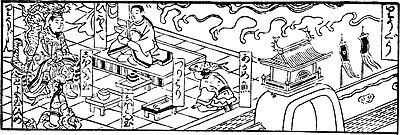pray thee do not look upon her." However, the Heavenly Grandchild could not restrain himself, but went secretly and peeped in. Now Toyo-tama-hime was just in childbirth, and had changed into a dragon.[1] She was greatly ashamed, and said:—"Hadst thou not disgraced me, I would have made the sea and land communicate with each other, and for ever pre-
vented them from being sundered. But now that thou hast disgraced me, wherewithal shall friendly feelings be knit together?" So she wrapped the infant in rushes, and abandoned it on the sea-shore. Then she barred the sea-path, and passed away.[2] Accordingly the child was called Hiko-nagisa-take-u-gaya-fuki-ahezu[3] no Mikoto.
A long time after, Hiko-hoho-demi no Mikoto died, and was buried in the Misasagi on the summit of Mount Takaya in Hiuga.
(II. 36.) In one writing it is said:—"The elder brother Ho-no-susori no Mikoto had acquired a mountain-gift. Now the elder and younger brothers wished to exchange gifts, and therefore the elder brother took the bow which was of the gift of the younger brother, and went to the mountain in quest
- ↑ In the accompanying illustration from a Japanese book (printed 1746), the Sea-King and his daughter are represented as combining the Dragon with the human form. See above, p. 61.
- ↑ "There are many examples of the disappearance of the bride or bridegroom in consequence of the infringement of various mystic rules." Lang's "Custom and Myth," p. 81.
- ↑ Prince-beach-brave-cormorant-rush-thatch-unfinished. The application of the latter part of the name will appear from one of the variant myths given below. See also Ch. K., p. 127.


